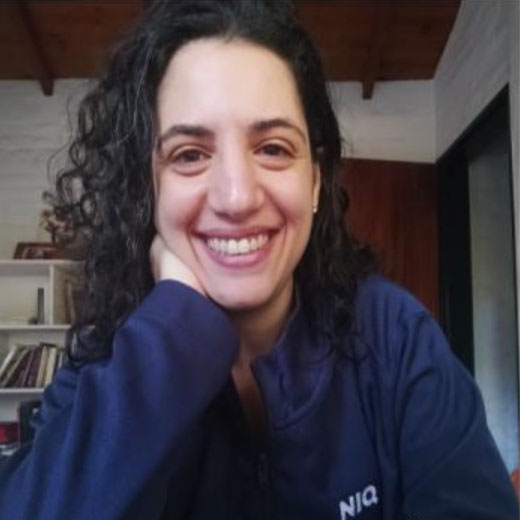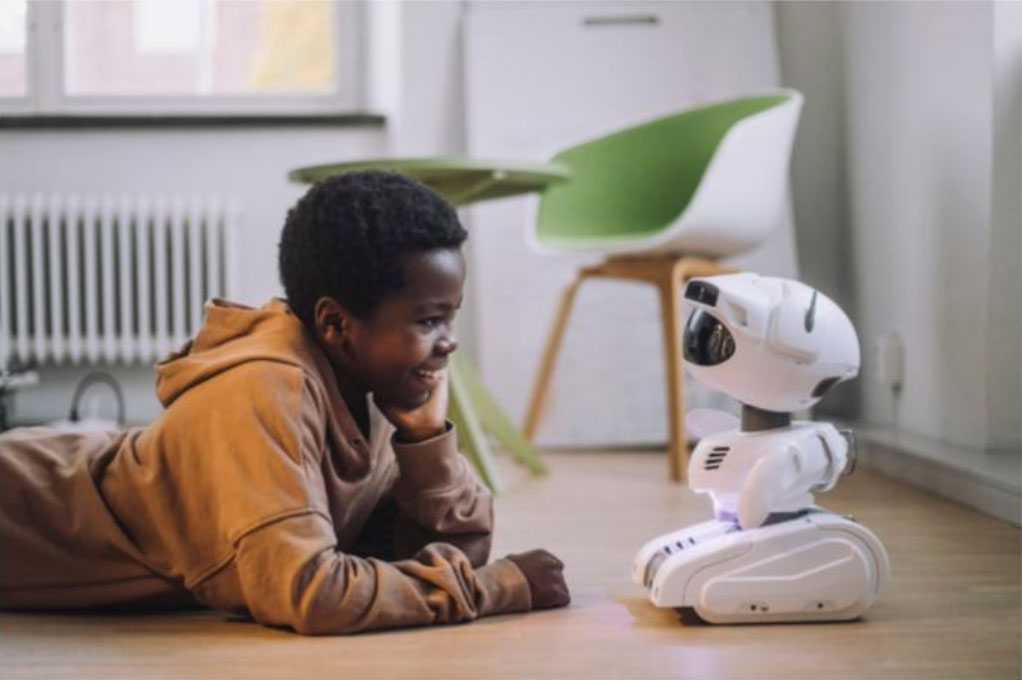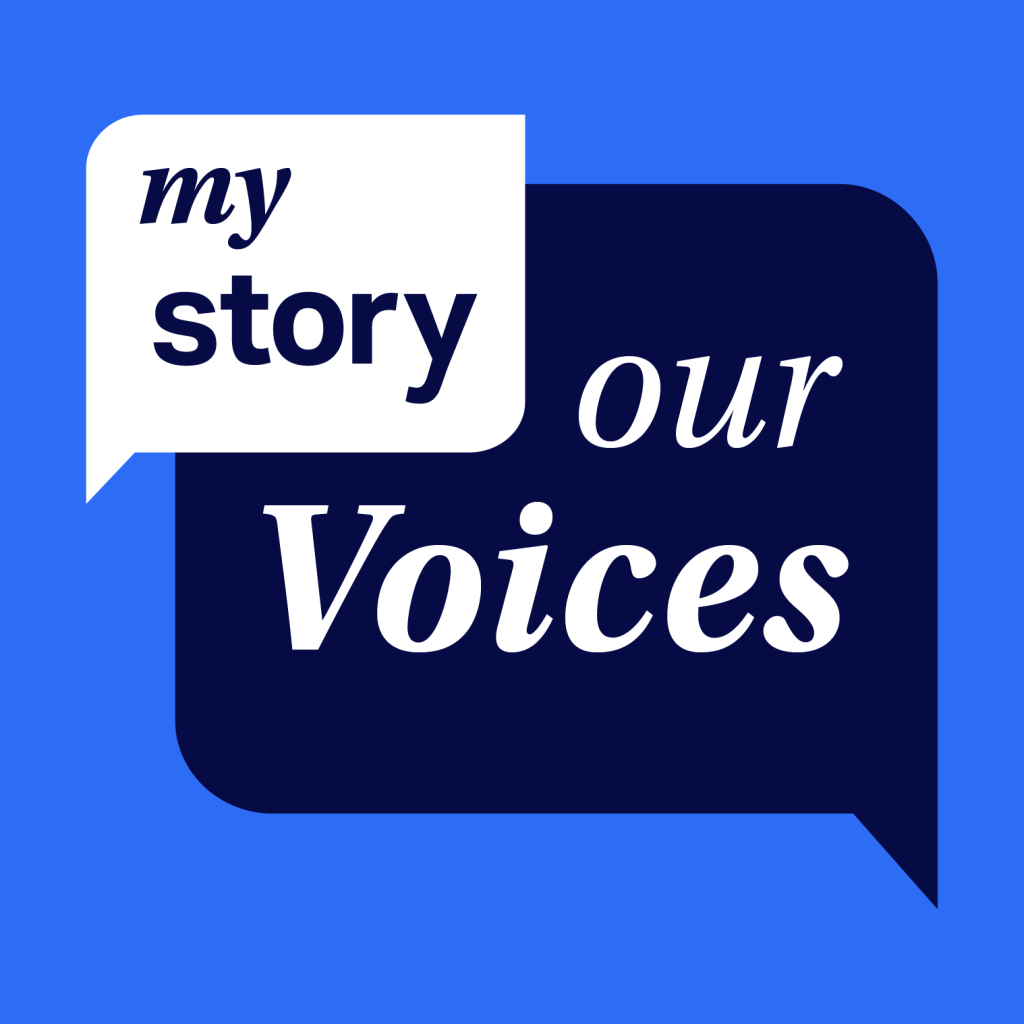Empowered by Generative AI – an NIQ Diversity Equity Inclusion Podcast
In this inspiring episode of My Story, Our Voices, part of NielsenIQ’s DEI Learning Series, four women from across the globe share how AI is transforming their work, creativity, and personal lives. From breaking language barriers to enhancing productivity and inclusion, hear real stories from NIQ employees about embracing AI with curiosity, courage, and critical thinking. Tune in and discover how technology is helping shape a more inclusive future.


Laila Litvin
Buenos Aires, Argentina
Sr Market HR & SPOC
Laila lives in Buenos Aires, Argentina, She is a Sr Market HR & SPOC and has been with NIQ for almost 9 years. She’s a psychologist and mom of a boy of almost 4 years old and is partnered with Alejandro for almost 15 years. Laila is keen on DEI and she loves to learn from different topics, no matter how random they are. She loves to cook and tries to make new recipes that do not always work and she really, really loves to dance (anything, anywhere).

Tatiene Vale
São Paulo, Brazil
Industry Insights Manager
Tatiene Vale is an Industry Insights Manager at NielsenIQ, based in São Paulo, Brazil. With over 15 years of experience in consumer insights and client strategy, she brings a deep understanding of the Health & Personal Care industry in Brazil. As an early adopter of AI tools and advocate for innovation and inclusion, Tatiene actively contributes to global initiatives that connect data, technology, and people.
HIDDEN
Location
Title
Short description
Summary
“It’s not about replacing how we work—it’s about enhancing it.” – Tatiene Vale
“I used to think I was cheating by using AI. But I realized I had to be even more intentional and clear about what I needed.” – Laila Litvin
In this episode of My Story, Our Voices is a powerful conversation centered on the intersection of artificial intelligence, inclusion, and personal growth. Guest host Catherine Gray, along with host Funda Kalemci, and guests Tatiene Vale, and Laila Litvin, share their unique experiences with AI—both professionally and personally—highlighting how technology is shaping their work and lives.
The episode begins with personal introductions and reflections on how each speaker first encountered AI. For Laila, it was a company-wide competition that sparked her curiosity, leading her to develop a tool that translated DEI-related terminology into multiple languages—an effort to make information more accessible across Latin America. Tatiene, who also participated in the competition and won, shares how AI has become an integral part of her daily workflow, helping her analyze client data, organize projects, and even refine her personal skincare routine.
Funda recounts her own early experience with generative AI, emphasizing how it empowered her to create a complex document without any programming background. All four women express how AI has enhanced—not replaced—their critical thinking, creativity, and productivity.
The conversation also explores the broader implications of AI in fostering inclusivity. Laila highlights how real-time translation and transcription tools have opened up meetings and resources to non-English speakers, helping bridge communication gaps and promote equity. The others echo this sentiment, noting that AI can democratize access to information and support diverse voices in the workplace.
Despite the benefits, the speakers acknowledge the importance of using AI responsibly. They stress the need for users to remain intentional, verify outputs, and maintain a critical lens. AI, they agree, is a powerful assistant—but not a replacement for human judgment.
The episode closes with words of encouragement for those hesitant to embrace AI. “You don’t have to be an expert to start,” says Tatiene. “Just be curious.” Laila adds that trying, testing, and refining your approach is key to discovering how AI can support both personal and professional goals.
This episode is a celebration of curiosity, courage, and the power of storytelling. Through their voices, these women show how AI can be a tool for empowerment, inclusion, and connection—when guided by thoughtful, human hands.
Transcript
Disclaimer: The views and opinions expressed in this podcast belong to the individuals who share them and do not necessarily represent Nielsen IQ. Note that this podcast discusses sensitive topics that may be triggering for some. For more information specific to this episode, see the episode description.
Jake Conlin: The views and opinions expressed in this podcast belong to the individuals who share them and do not necessarily represent NielsenIQ. Note that this podcast discusses sensitive topics that may be triggering for some. For more information specific to this episode, see the episode description.
Hi everyone and welcome to the My Story Our Voices Podcast, a core component of NielsenIQ’s DEI Learning series, Me and you. My name is Jake Conlin and if this is your first time tuning in then let me tell you what this podcast is all about. In a nutshell, it’s about stories, your stories. We think stories are important because when we tell them we open the door and allow others to see the experiences that shaped us, that challenged us and helped us grow. By doing this, we can create a culture where open dialogue is encouraged, and we can have a space to discuss important topics in a transparent and courageous manner. So, minimize that e-mail tab mute your chat and take a little break to listen to an NielsenIQ story.
Funda Kalemci: Hi, everyone. Thank you so much for tuning in to our newest episode of My Story Our Voices. My name is Funda Kalemci. My pronouns are she and her. I’m the global leader for DEI and Well-Being at NIQ. And today I’m joined by our guest host, Catherine.
Catherine Gray: Hi, everyone. I’m Catherine Gray, Senior Communications Manager. My pronouns are she/ her, and I’m really happy to be here with you today for my first time hosting the podcast. I’m especially excited to do it as I lead the AI communications building rapidly, and I’m passionate about helping us all navigate and talk about it in ways that are clear. So, today we are going to be talking about AI, how it is showing up in our work and lives, and we’re joined by two incredible guests, Tatiene Vale and Laila Litvin, who will be sharing their personal experiences and insights. Tatiene, let’s start with you. Could you introduce yourself?
Tatiene Vale: Sure. Thank you, Catherine. So, my name is Tatiene. My pronouns are she her, and I am an industry insights manager here at NIQ, Brazil. I have been working mainly focused on the home and personal care industry for the past 15 years now. And I’d like to say that I am a data person with a creative heart, always exploring new ways to connect insights, people and possibilities. And lately, AI has been one of the most exciting tools on that journey. I’m very excited to be here with you all today to share and learn more about it. So, girl power here today.
Funda Kalemci: Wonderful. Thank you so much. Laila?
Laila Litvin: Hello, everyone. Thank you for the invitation to participate. I’m senior market HR for Argentina and also SPOC for LATAM. My pronouns are she/ her and I’ve been working in at NIQ for almost 10 years with a different range of positions inside HR and I’m super keen on diversity, equity and inclusion topics as one of the global leaders for people and planet this year and leading ADEPT for LATAM. So those are my motivators and that’s one of the first approach that I have with AI regarding how can we be more diverse and inclusive in the workplace, so thank you for having me.
Funda Kalemci: Well, you dive right in, Laila. And let’s take it from there. But I want to start, you know, a little, you know, take a step back and like, how long have you been using AI? What made you start? Thinking about using it and how often do you use it? Now let’s start with you.
Laila Litvin: My first approach to AI, I have to say it was last year when we have this contest to create different solutions using copilot, I have to be honest, that was my first approach at all with AI I was a little bit curious and I didn’t know what to expect, but one of the things that I always have in my mind when we work in a very global company and everything is in English but I work in a region where not everyone speaks English very well and there is a lot of initiatives or policies or meetings that there is a lot of people that maybe doesn’t understand what is happening regarding the topics and. What I wanted to do is to create a tool that can translate in different languages. Terminology that is related with ADEPT and that can be easily updated it and with an easy access to different associates so they can learn about disabilities and terminology that is related to. So I participated in that contest and get to the semifinals. I think stages. So, it was great. It was really a great way to learn about the abilities and the possibilities that AI was given.
Catherine Gray: I loved it. That was your first introduction. To AI, because that was the whole point of the competition. And I know Tatiene you took part as well. So, could you maybe tell us a little bit about how you’ve used AI when you started using AI and how you found experimenting with it?
Tatiene Vale: Sure. Actually it was quite similar to Laila’s started using AI. I also started when we had this contest last year for making prompts to compile. Actually, I was the winner last year in this global competition, so I’m very proud of it and it was very exciting. It was my first use of this platform and I work with analysis mainly my whole life here at NIQ and we work thinking about how we put together or connect to the dots of the analytical thinking to make recommendations for our clients. I mainly work with the industry as I was telling you about the HPC industry and then our main challenge was to connect to the dots and make recommendations that made sense to our clients. So, I started participating in the competition to create a prompt that actually helps us understand our our clients. Matter at that time because we also have a lot of information about the industries that we work with. But spreading the Internet, or sometimes we have some file internal files here that talk a little bit about the client, the performance in the market and then. The competition and using copilot was an opportunity for me to understand how the tool could enhance our knowledge and our approach to our clients. And even if you don’t work directly with a client, everyone has to know and understand why we are working with such thing and. What is the impact that we want to cause for our clients and for the industry? So, it was a challenge for me and that’s why I started using it. But actually today I use it pretty much every day. Honestly, I love it. I cannot imagine my life without the AI anymore. It’s because of that global competition. It actually had a pretty good impact in my daily job and my daily tasks and I of course use it. Since then I have been using it. For writing emails, translating things, and of course I use it for this kind of stuff that is more common when you are starting using AI, but it also helped me organize and plan projects and of course outside work I use AI as well. I use it to create smarter grocery lists and to plan trips, and most of all, as I work with the HPC industry to refine my skin care routine that I can talk to you a little bit more later on. So it’s actually being part of my daily life really as. Every time that I see an opportunity, I am curious to test and try it. It can also bring a different kind of perspective to me, so it’s really helpful for the job and also for my personal life.
Funda Kalemci: Love that, Tatiene. You know when both you and Laila were talking about, you know how you got introduced with the competition. I’ll tell you my funny story about that competition. I missed the deadline to enter the competition, but my personal story started a little earlier than that when Gen. AI was just started. I think this is 2 1/2 years ago and I needed to create some document that would collect responses and then calculate answers and I have no technical skills. I’m a literature major. I have no programming background and Gen AI was brand new at the time, so I was like, why don’t I try this? And I did. It took me 5 hours on a weekend to get one PDF document that would do everything that I wanted to do if I knew how to use Java. If I had any programs still that would have taken me 5 minutes. But even without that knowledge, you know. Having that capability was amazing. I got it done all by myself all weekend with no help and that was my entrance to the Gen AI world. And ever since, as you said, it’s again, it’s like I cannot live without it anymore. It makes my life a lot easier. But what I love about your stories is. This really embedded the use case both for your work and your mission into Laila’s story. She’s really passionate, and I know this for a fact because she is leading one of our ERGs here at NIQ. She embedded her passion into this and blocked that inclusivity. Into the Gen. AI topic. And for the chin like you, you know what is possible to do for your clients out there. And you brought that there. So I love that with that. I want to ask, let’s start with you touch and I think what is 1 lesson from? Using AI Gen. AI. That has made your use most impactful.
Tatiene Vale: Ohh, that’s a tough one because I have many learnings in many situations, but I think that one big learning that I have to share is maybe some people might think that it’s just about saving time. And of course it is. It really helps save time, but it also helps bring clarity and structure, things that were pretty complex. So I have these two examples, 2 cases. To share the first one, I already told you about a little bit. It was in the competition when we gathered a lot of complex information about a client, for instance, and you want to summarize it and to have a lot of valuable information to work with to understand better your client, to make more impactful recommendations to them. But it also helps. First started at the company, for instance, like we are, you were doing an onboarding of someone. You were trying to teach the person how we work and how it’s going to be working with that client and all. So, it it saves time, and it saves times in a very intentional way of gathering a lot of complex ideas and a lot of data and transforming it into valuable insights in this daily routines. Like every time you are doing an onboarding or you are telling something to someone. And it helps you to be more intentional, I believe. And the second project that I wanted to share, it was also last year here in the industry Insights team, I led an internal competition with our account executives and we have around 30 people involved in that project between participants and the judging panel. And in that competition, there were so many moving parts, and the copilot helped me stay on top of everything. It made a big difference in structuring the presentations across all three phases. It was a long-term project. It took like four months to conclude everything and make sure we followed every rule, every question and help me anticipate which questions could come up during the presentations or doing the competition and testing the rules that we were creating to evaluate each participant so. It helped me a lot conceiving the project and it also helped me coordinate schedules and keep the project organized because there were so many people involved and it was really useful in that sense to me as well. So in both of these examples, they were work examples, but in both of them it was about saving time, but it also helped me refine my critical thinking and thinking about different perspectives and bringing structure to things that were really complex.
Catherine Gray: We think that’s really interesting because something that people often think about when they talk about AI or they think about using AI is that they are like losing skills or parts of their role is getting replaced and you spoke about how by using AI and by using copilot, you’re having to enhance other skills like critical thinking. So I wondered if you had anything to add like what is your most impactful story and is there anything that you can think about where you’ve had to? We enhance or rely on other skills to help you navigate using the tools.
Laila Litvin: Yeah, actually, I may be the less pro user in this group, but one of the things that I totally agree with, Tatiene, is that you must think a lot. You know, it’s one of the the things that I used to think when I started to use it is I’m cheating. I’m cheating. You know, I I’m putting the information on this machine, whatever it is, iIt’s going to solve me. But when I start to use it more and more and more, I realized that I really need to be super clear on what I need and be intentional and think how to challenge and not to buy the first option that copilot give me. It’s really interesting on how you can review what you were thinking of. What are your needs and try to think again and refine what you are going to ask. And it’s a really interesting exercise for me in my personal use. It’s funny because I I always trying to find new recipes and try to eat. As Milan said, I can and I have a four year old child that is very open to try new foods but has to be like in a familiar way and it helps me a lot to think new combinations and new recipe. Is and how the ingredients can boost their ingredients or or the non ingredients the quality of that ingredient can be hosted with the adding or from another one. So, it helps me to develop my creativity. In some way and it’s great.
Catherine Gray: Laila, I love that you talk about using in your personal life. I do as well. I think my screen time on my phone has gone up a massive amount because I’m constantly using different Gen. AI tools to do things like you said like recipes. Help me with exercise programs. It’s very similar to how you do it actually. I wondered if you had any similar experiences, because I think when thinking about how to use AI in your professional life, you build a lot of those skills up in your personal life when you’re using it.
Funda Kalemci: And more relaxed.
Catherine Gray: Way at home. So do you have any experience with that?
Tatiene Vale: Yes, of course. I actually really agree with Laila. She was also talking about being intentional and guides the tool with the right context, and that we really need to take the answers that AI provides us in a critical thinking and my personal news actually has something to do with this as well, because as I was telling you earlier, I also use it to refine my skin care routine. OK, wait, I know. I’m not saying that you shouldn’t consult to a dermatologist or consult a doctor. It won’t replace a doctor, but I really had some products at home that I really didn’t know how to use them correctly and or if they were correctly or appropriate to my skin. And then I talked to the AI and I told the AI about my habits, my food that I eat, the water that I drink, how much water I have been drinking, if I I’m doing sports or not, because all of this influences in your the health of your skin. So, I shared all all of this, my habits with the AI and the products that I had at home. Because I do a lot of purchases and then sometimes I gain a lot of free stuff like samples to try of new product. And I was sharing with the AI. So, listen, this is my habits. My skin is like this. And I have this product. Do you suggest a routine for me or something that I could try or this product’s good for any purpose. And then I was talking to this to the AI and it really suggests me something nice about everything that I could try for a week or two and then we could see if it was working or not. And at first one of the suggestions that I did, once to use a really strong product like a massage in my my face in my facial skin care and I was like, whoa. Come on. It’s too much for my face. I have, like, some sensitivity and I have something that it’s too much for my skin, so I just talked to it and I said, hey, come on, let’s rethink about this recommendation and it changed it. So, it’s important to know what you’re looking for and have some repertoire to you know, talk to the AI and refine the results so you cannot rely 100% every time on what it’s telling you, but it’s important because you can also track your progress. So, at the first week after the first week or the first days I was talking today. Hey, my skin looks like this. It did work. This didn’t work so. It’s nice to have this kind of follow up with the AI.
Funda Kalemci: I love the fact that you just mentioned that we cannot rely on 100% and. Totally agreed. Both for business or personal use, I would definitely say the same thing. I’ve had the funniest conversations with my AI companions, both for work and for personal. One anecdote is I’m working with Copilot on a project that I’m working on and it just keeps filling in the blanks for me with made-up storylines and at some point I got frustrated and you just made it up and it responds, I’m so sorry. Yes, I did. Because you didn’t give me this or that and so the you know the moral of the story here, I guess is, one, we have to be an, you know, educated consumer, just like anything else. We need to make sure that we know our stuff and then we get support from Gen. AI to refine it, because that knowledge that you bring to it is really crucial and the personal one. Which I love because my husband and I are in the US right now visiting and we’ve done a few road trips and I relied on another tool to plan my road trips and then it suggested a few places that were closed for years. And of course I had to, you know, check back so you know, to your point, we cannot rely on 100% but. It is. It definitely improves the quality of the things that I’m doing and by that I mean it reduces the time that I have to spend on planning. Because I can rely on it, it’s almost like a personal assistant, right? Like you give all the information and it gives you a greater, you know, faster, not greater, but faster planning. So love that. Next up. Laila, I wanna bring us back to something. You mentioned about inclusivity. Especially the language barrier, because it does help. Right. Do you think AI can help bridge communication gaps across cultures or communities, especially when we’re talking about language barriers that.
Laila Litvin: Definitely. Actually, you taught me in one meeting that we had about two that you can activate subtitles. In life, when we’re having meet and that blows my mind because you cannot imagine how many meetings colleagues of mine in
LATAM and associates from different areas, like that position, for instance, but cannot be present in in different meetings due to the language because they don’t speak English fluently and they got lost and they doesn’t feel comfortable and with that’s all a whole world of possibilities was available for them. And actually, when you have to translate documents to a different language, you need to have some knowledge to see if that’s correct or not. If you have to adjust some words or rephrase some some sentences. Yeah, yeah. But it’s incredible. It’s easier. It’s precise and that helps us a lot to to be more democratic in a manner of speaking. You know that everyone can understand the information that the company is sending. And I know that we must to tend to be more fluent in English. But in that journey have tools to support us and to help us to be informed and create the the possibility to participate in different spaces. Is the definition for me of diversity, equity and inclusion.
Funda Kalemci: Love that. It definitely brings that equity for access, right? Everybody can understand each other without necessarily speaking the same language, right? I love that Teams support that function. And we can turn it on anytime we need. Exactly, yeah.
Catherine Gray: So I think a really important thing as well and I think it ties nicely into that kind of thing about bridging that gap between cultures and communities. And I think people often see more technology and emerging technology as this really negative thing, but we can talk about all of these amazing things that it’s doing, like bridging those gaps and helping us be more productive and helping us plan better. I know that I definitely feel like I get way more done, both professionally and personally, but we can see that not everybody is actually embracing the technology and I think it’s really nice that we have 4 women on this call today talking about the technology because there is studies that have shown that women, particularly are not embracing the tool as quickly as men. So, I think it’s really nice that before visiting and having this conversation, what would you say to somebody who is apprehensive about using the tool?
Tatiene Vale: I would say you don’t have to be an expert to start, just be curious and all of the examples that I was telling you about earlier, especially at work, was actually with the simple copilots copilot license. Now for over the last month I have been granted access to a copilot premium license. That is also really helpful because it’s quite integrated with my Microsoft tools, so with teams and with the outlook, the emails and all of that stuff, it’s quite useful to summarize emails or to. You know recap the main topics of a meeting. Each is really useful also inclusive to use as Laila was also telling us about. But I would say that you don’t have to have that. Free premium license of any 2 of any AI tool you can just be curious and try to use it in your daily basis. Just try using AI for something simple that you already do often, like summarize a meeting or this rephrasing e-mail that we were talking. The goal isn’t to replace your how we work. It is to enhance your work. As we were talking about it’s also to make you think better to save time to try to, you know, make complex things more simple to digest and to understand and to. Organized and it’s totally normal to feel insecure at 1st and I was insecure at first too. But you just have to try it and be curious and test it. And once you try it, actually you’ll see how much lighter and smaller some tests can be. You are still in the driver seat. It’s like I think, Funda said. It’s like your personal assistant, really. And he can go from since the more most simple tests to more complex tests. But at the end of the day, it’s you who is making the call and just be curious and try it. And if you don’t like it. You can tell me, but you will like it.
Catherine Gray: Laila, is there anything that you would add in terms of speaking to people who feel apprehensive about using AI?
Laila Litvin: I believe that the Tatiene summarize it very well, I always say but you have to be curious and understand that of course you need to check and verify, but nothing harmful can be for using it. It’s just to try and write once and rewrite twice to understand how it works. And be mind open so you can think for the things that you need the assistance and you will see the several opportunities that you have to use it and to make your life easier both in work and in your personal life. So be curious.
Funda Kalemci: Wonderful. Tatiane and Laila. Thank you so much for sharing your experiences with using AI Gen AI. We really appreciate hearing your stories that turn into our voices overall. Thank you so much. And Catherine, thank you for taking the time to be my cohost today I really enjoyed doing the show with you. Thank you everyone.
Laila Litvin: Thank you so much.
Catherine Gray: Thank you so much. Thank you for having me.
Laila Litvin: Was a pleasure. Thank you. Thank you.
Jake Conlin: Hey everyone. It’s Jake again. We hope you’ve enjoyed this episode of the My story, Our Voices Podcast, TuneIn next time to hear more stories from the IQ community.
Laila Litvin: It helps me to develop my creativity in some way and it’s great.
Funda Kalemci: Knowledge that you bring to it is really crucial.
Catherine Gray: People often see more technology and emerging technology as this really negative thing, but we can talk about all of these amazing things that it’s doing, like bridging those gaps and helping us be more productive.
Tatiene Vale: Honestly, I love it. I cannot imagine my life without AI anymore





